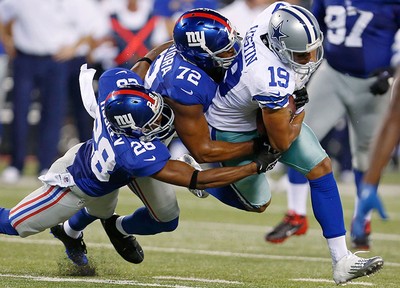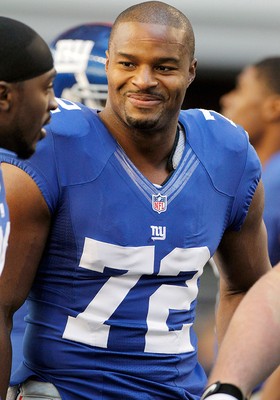
A Man To Watch: Osi Umenyiora

Tony Gutierrez/AP/Shutterstock
I moved to America when I was 14. I had older brothers and sisters. I’d play basketball with their friends and they’d tell me I should try out for the football team. American football is by far the biggest sport out there and I realised the football players got all of the girls and the good stuff. I was a kid from Africa who didn’t have many friends and it seemed like a cool way to meet people.
I didn’t grow up loving American football. I don’t think I’d even heard of it before I moved there, but I got pretty good at it and won a scholarship to play at college. That’s where I got really good and from there I was drafted to the New York Giants. The same thing probably couldn’t happen over here. With soccer, I think you need to be playing from when you’re a kid to achieve the necessary skills and technique. With American football, if you’ve got athletic traits and a fundamental physical ability, you can pick up the skills in a relatively short period of time. That’s where I got lucky.
Imagine something you’ve dreamt about and something you’ve had in your head every day for a long time. Now imagine that actually happening tomorrow. That’s the best way I can describe what winning the Super Bowl felt like. The whole country has come to a stop, everybody’s watching and it’s the pinnacle of the sport. Suddenly you’re there. It was amazing, especially because of the way we won it in 2007, as underdogs beating an undefeated team late in the game.
I can’t lie, winning the Super Bowl for the first time was 100% the best. But I can remember winning it again in 2011 much more clearly. With that first one, it’s almost like somebody else was playing and I was just watching – almost like it didn’t happen.
Work is what makes the difference in professional sport. At that level, everyone is pretty much at the same level athletically, but a lot of people just aren’t willing to put in that extra effort. If you want to win, you’ve got to make sacrifices. There can’t be any getting drunk and partying; to get to the next level, you’ve got to do the things other people aren’t doing. I learnt that from my mentor Michael Strahan. He’s a Hall of Fame player, one of the all-time greats. When I first started at the Giants, I would go to practice, do it, get in my car, go straight home and I was so tired. He showed me that that’s what everyone else was doing. To be better, I had to lift weights with him after practice. I had to watch video tapes and learn how to break down opponents properly with him after practice. That’s what made him an all-time great and helped me to excel.
The best players I played against were both cerebral and competitive. As quarterbacks, Peyton Manning and Tony Romo were really difficult to play against. All the times we played against Tony, I think we might have beaten him twice. A lot of people expect me to mention Tom Brady at this point. He’s a great player, no question, and I know his accomplishments, but we played his New England Patriots four times and beat them three times, so from my perspective, he’s not the greatest player I ever played against.
I don’t miss playing. Maybe it’s because I started so late and football just wasn’t in my blood. It’s something I picked up and it kept rewarding me, so I kept on doing it. I’m grateful for the opportunity and what the game gave me – it gave me everything I could have got from it – but I don’t miss it. Well, except for the locker room. I miss my friends. As soon as you retire, you’re no longer part of that world, and the locker room is an insane place to be.
When I retired, I wanted to rest, relax and chill. I seriously planned on doing nothing. A year before I retired, my wife said I couldn’t just stay at home and I had to do something. So I went to speak to NFL International. With my background, they sent me to England about a week after I retired. There wasn’t a show at that point. I was going to the NFL office and we were looking for ways to expand the game over here. Then suddenly, bang, midway through a season they said there was going to be a show, it was going to be on the BBC, and they wanted me to be a part of it.
The show works because we have a real affinity for one another. I’m on the sofa with another ex-player, Jason Bell, who I was good friends with before we started. Mark Chapman, the presenter, is a really good guy and we all know our roles. When people watch, I think they see the camaraderie. It can be difficult to balance humour and analysis, but we don’t take everything too seriously, though when it’s time to be serious, we can do that.
Away from the show my life is pretty much all about kids, training and eating. I’m also helping to build an NFL academy in Nigeria. I’ve seen what the academy in London has done and there are some tremendous athletes in Nigeria who just don’t have an opportunity. You have soccer academies that bring kids to Europe and, if it doesn’t work out for them, they are done. I want to do things a bit differently. Basically, they can trade their athleticism for an education. They can go to US high schools, go to US colleges then, if it works out and they go professional, great. If it doesn’t happen, they’ve got a college degree to fall back on.
There’s a big growth opportunity for the NFL outside America. I’ve seen what the NFL was able to do for me. If I can help replicate that for one other person, great. If I can replicate it for 10 other people, that would be just incredible, so my goal is to help the NFL get bigger – in the UK, in Nigeria and beyond.
The UK is not far away from producing NFL superstars. Realistically, it’s probably five years. Until now, it’s been one thing taking rugby players and trying to convert them. Now, with the academy here as a pipeline, we can start getting to players in that sweet spot when they’re 14 or 15. Eventually, those are the ones who could end up going to college in the US and progressing from there.
I would be absolutely shredded if I didn’t eat so much. I try to work out every day and do a variety of stuff: a couple of classes a week, Pilates, boxing, five-a-side. I bought a Versaclimber that’s come in pretty handy during lockdown, but food is primarily what makes me happy. Biscuits, pizza, fries, chocolate, popcorn – all of that sort of stuff. I’m in pretty good shape right now but, if I didn’t eat so badly, I’d be really ripped.
Watching what I eat has never been a thing for me. I didn’t have to be really ripped even when I was playing. I was a defensive lineman, which meant I was supposed to be really big. Nothing was off limits to us. We could eat pretty much anything and I was probably 40 pounds heavier then than I am now. The only time I’d think about what I was eating was before a game – carbs for energy. Other than that, nutrition wasn’t a big thing and I think that’s still the case for linemen today. Maybe they’re not eating quite as dirty as we did, but they’ll still be eating a lot. For some of the others, the speed guys on the pitch, it’s probably changed a bit. But my point is still: if you’re going to be really ripped, it should be for a reason. In fact, it should be your job! Because there are a lot of things you’re going to have to deny yourself.
When I was in America it was all jeans and big baggy tees. I don’t think they understand fashion in the same way out there and I wasn’t really interested in it either. But European men are very stylish; they dress a certain way and it looks good. Since I’ve come back here, I’ve got a lot more interested.
When you’re dressed properly, there’s a swagger that comes with it. Looking good gives you confidence and that’s the case whether you’re big, tall, skinny, whatever. As long as you’re dressed well, people are going to be drawn to you. That’s something I only really got the importance of when I moved back here.
My wardrobe is popping right now. I’ve changed up my style for the new season of the show. I’ve got a tailor who makes my suits. I like to think we’ve always looked sharp in our suits and I’m still all about nice shoes and stylish shirts, but I wanted to be a little bit different – to add a bit more pop. Neil Barrett’s new stuff is off the hook; Sandro’s very nice, Off-White is really, really cool and then there’s Balenciaga. If people don’t like what I’m doing, I just say they don’t understand fashion. My wife likes it – that’s the important thing.
I don’t really have any unbreakable style rules because things can always change. But I did used to say I’d never wear jeggings and that’s still the case today.
Watch The NFL Show on Saturday nights on BBC1 and follow Osi on Twitter and Instagram.
DISCLAIMER: We endeavour to always credit the correct original source of every image we use. If you think a credit may be incorrect, please contact us at [email protected].